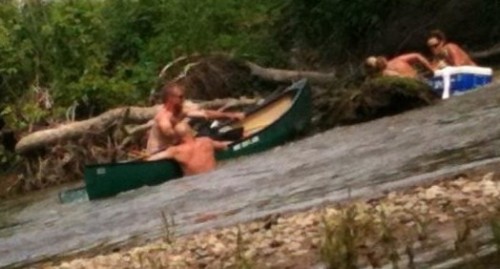clichés are cliché
You shouldn’t go camping or canoeing on Memorial Day. It’s cliché. So I always go camping or canoeing. Mostly to see the inept, the drunk, the sun-charred, the unclothed, the loud, the wet: Example, White River below:
Jerome Stern said single words can be cliché. Azure or don. He claimed to have never heard these words actually spoken aloud. He also goes after blurt.
I wonder if clichéd phrases change over time, their meaning. Easy as cake. Was it once simpler to bake a cake? I recently made a pie so horrid my own dog refused to take one bite. And I lived in Memphis, TN for years, so never understood something as easy as “a walk in the park.” Walks in the park could be fatal in Memphis.
Stern also says that readers of mainstream/popular fiction don’t mind clichés so much, and that romance writers actually use them as code, as comfortable and familiar and expected (by the reader). This comes across as a bit elitist. But:
Here is a handy cliche finder.
I think in literary fiction, maybe situations are more cliché than words or phrases. The young man goes to the party. The apartment argument. The trip to a foreign land? The country mouse/city mouse disconnect story. Academia. Others?
The first man to compare the cheeks of a young woman to a rose was obviously a poet; the first to repeat it was possibly an idiot. Salvador Dali
A bit harsh, me thinks. Clichés are passed along because they are often apt. Their very survival might point to their effectiveness as metaphor, or as mnemonic device. Is it always laziness? I suppose the challenge is to first recognize the thing, then decide to use it, or make it new.
(“make it new” possibly cliché)

